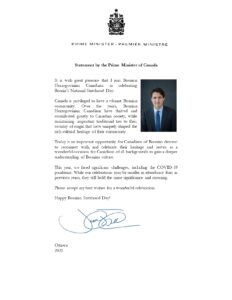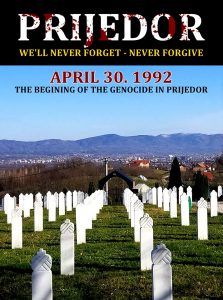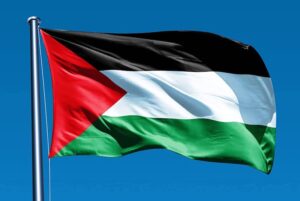Bosnia: land of tears
By: Suzana Vukic
Columnist, The Hudson/St.Lazare Gazette
Suzana Vukic is the member of the International Expert Team of the Institute for Research of Genocide, Canada
Before even landing in Sarajevo, I experienced a foreshadowing of what my trip to Bosnia would be all about. Aboard the plane from Munich to Sarajevo, I happened to be sitting next to a woman (name withheld upon request) from St-Louis, Missouri. She was returning to Srebrenica to bury her husband, having already made trips in previous years to bury her father and brother. This woman had a total of 120 family members, male and female, killed during the Bosnian war. The remains of many of her deceased have yet to be uncovered.
I learned something that day that would prove to be true in the days to come once I had a chance to become better acquainted with this grief-stricken land and its people. When people talk about their war-related losses and suffering, it’s difficult to know how to respond in the face of such horror. What do you say to a woman who not only endured wartime rape, but also had her children slaughtered right in front of her? What can I possibly say that wouldn’t come across as sounding stupid or trite?
And yet it’s so important to listen, to let people in Bosnia know that the world hasn’t forgotten about the war and what happened to them. Every single person in this country has been affected by the war. This includes those born after the war ended; their lives and their surroundings are affected by what happened 20 years ago.
After Bakira Hasecic, President of Women Victims of War, and her friend picked me up at the airport, she brought me to her new office for a brief visit with her women. Once we were done, we took a taxi to the Sarajevo suburb, Reljevo, where I would be staying. We exited the street where Bakira’s office is located. I looked back and noticed the shelled remains of an outer wall of the Marshall Tito army barracks just down her street. As we crossed an underpass, the taxi driver explained that on this street, Pofalici, 20 years ago at the beginning of the war, Bosnian army soldiers battled against Bosnian Serb soldiers in what became known as the Battle of Pofalici. Bosnian Serb soldiers positioned at the opposite end of this street behind us, up on Mount Grbavica, were trying to join forces with their fellow soldiers located high up on this hill, above the underpass. Their aim was to divide Sarajevo in half and overtake it. Bosnian army forces prevented this from happening. Had they not succeeded, Sarajevo residents, and Bosnian citizens throughout the country, would have suffered an even worse hell than the one they actually lived through during the war, hard as that may be to believe.
Today, Bosnians are battling a different sort of evil. The day after my arrival, I visited Dr. Smail Cekic, Director of the Institute for the Research of Crimes Against Humanity and International Law at the University of Sarajevo and his colleagues. Dr. Cekic showed me a copy of a book written by Serbian “academics”, in Cyrillic, titled Srebrenica: A Falsified History. As the title suggests, it’s a body of work that denies and minimizes the genocide that occurred in Srebrenica in July, 1995 when Bosnian Serb forces, led by Gen. Ratko Mladic (currently on trial for war crimes at The Hague) overtook Srebrenica, slaughtering 8372 Bosniak men and boys.
“Academic” works such as these are an obscenity and an insult to those killed during the war, as well as to survivors. Before I even set out for the Srebrenica Peace March and the commemoration and burial at Srebrenica-Potocari on July 11th, I met people whose lives have been blighted by what happened to them in Srebrenica 17 years ago.
I headed north to Tuzla the day before the March, to be close to the starting point, Nezuk. But before I left, I visited a young bride, Jasna, and her family from a neighbourhood close to my Sarajevo residence. Jasna’s family is from Srebrenica. Many members of her family were killed when Srebrenica fell.
This day of nuptial celebrations reminded me that life goes on, for those fortunate enough to be living. Yet nothing can make up for the great evil committed against the citizens of Bosnia-Herzegovina two decades ago.
For information on how to donate to Women Victims of War, please contact me at: suzana.vukic28@gmail.com
http://www.hudsongazette.com/Commentary.html



